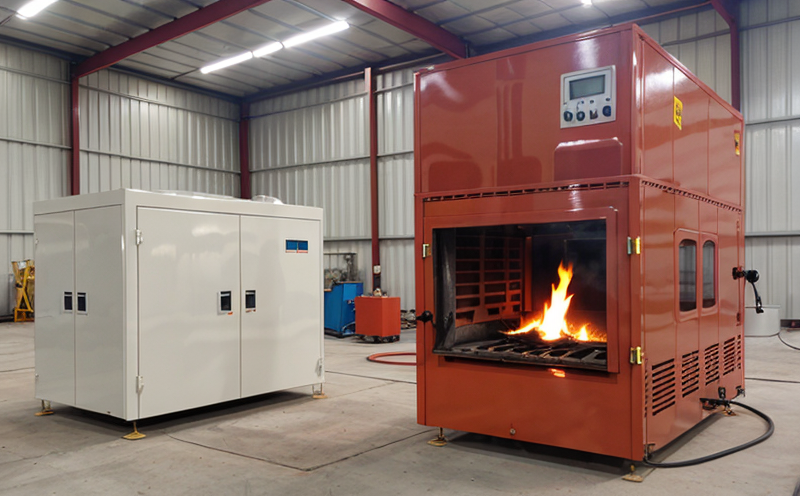ASTM E2550 Dynamic Mechanical Analysis (DMA)
The ASTM E2550 standard provides a comprehensive framework for performing Dynamic Mechanical Analysis on materials to determine their viscoelastic properties. This service is particularly valuable in the metallurgy and material testing sector, where understanding how materials behave under dynamic loading conditions can significantly impact product design and performance.
Dynamic Mechanical Analysis (DMA) involves subjecting a material sample to alternating mechanical stress at varying frequencies while monitoring its response through displacement or strain measurement. The test measures both storage modulus (G'*) and loss modulus (G''*) which are critical for assessing viscoelastic behavior over a wide range of temperatures.
The ASTM E2550 DMA service is widely recognized in industries such as automotive, aerospace, electronics, and medical devices. It allows quality managers, R&D engineers, and compliance officers to ensure that materials meet stringent performance requirements by providing precise data on thermal properties.
Typical applications include:
- Evaluation of polymer blends for blend compatibility
- Determination of glass transition temperature (Tg) in thermoplastics
- Monitoring the effect of heat treatments on materials like metals and alloys
- Prediction of material behavior under dynamic loading conditions, especially important in safety-critical industries
The DMA process involves meticulous specimen preparation. Samples must be homogeneous and free from defects that could skew results. The testing apparatus used is equipped with sensors capable of detecting minute changes in displacement or strain to ensure accurate data collection.
When interpreting the results, it's essential to consider factors like temperature range, frequency sweep, and sample size. These parameters significantly influence the outcome and should be carefully selected based on the specific requirements of the project.
The ASTM E2550 DMA service provides a wealth of information that can guide product development and quality assurance efforts. By leveraging this data, organizations can make informed decisions about material selection and process optimization.
Why It Matters
Determining the viscoelastic properties of materials is crucial for ensuring their suitability in various applications. Understanding how a material behaves under dynamic loading conditions helps avoid failures due to unexpected stress or temperature changes. This service is particularly important for industries where product safety and reliability are paramount.
For instance, in the automotive sector, understanding the viscoelastic behavior of materials can help prevent accidents caused by tire blowouts or brake component failures. In aerospace applications, accurate DMA results ensure that components like landing gear and fuel tanks perform reliably under extreme conditions.
The ASTM E2550 DMA service also plays a vital role in compliance with international standards such as ISO 19469-3:2018 and EN 17266, which require manufacturers to demonstrate the reliability of their products through rigorous testing. By adhering to these standards, organizations can ensure that their materials meet stringent quality benchmarks.
Additionally, DMA results are invaluable for R&D teams seeking to innovate in areas such as smart materials and energy-efficient designs. The ability to predict how a material will behave under dynamic conditions allows engineers to push the boundaries of what is possible while maintaining safety and performance standards.
Applied Standards
The ASTM E2550 DMA service strictly adheres to the guidelines provided in ASTM E2550-18, which covers the dynamic mechanical analysis of materials using oscillatory shear. This standard ensures that all tests are conducted under controlled conditions to produce consistent and reliable results.
Some key aspects covered by this standard include:
- Determination of storage modulus (G'*)
- Evaluation of loss modulus (G''*)
- Sweeping frequency range for optimal data collection
- Temperature control to ensure accurate results
The standard also provides recommendations for specimen preparation and test conditions, ensuring that all samples are handled uniformly. This consistency is vital for comparing results across different laboratories or over time.
International Acceptance and Recognition
- Australia: The ASTM E2550 DMA service is widely accepted in Australia, particularly within the aerospace and automotive industries. Compliance with this standard ensures that materials meet stringent quality benchmarks.
- Europe: Across Europe, especially in Germany, France, and the UK, ASTM E2550 DMA testing is a critical component of material evaluation. It is often required for products destined for export to these markets.
- Japan: In Japan, where quality standards are among the highest globally, ASTM E2550 DMA results are frequently used in conjunction with other tests to ensure compliance with JIS (Japanese Industrial Standards).
The universal acceptance of this service across these regions underscores its importance in maintaining global trade standards and ensuring product reliability.





